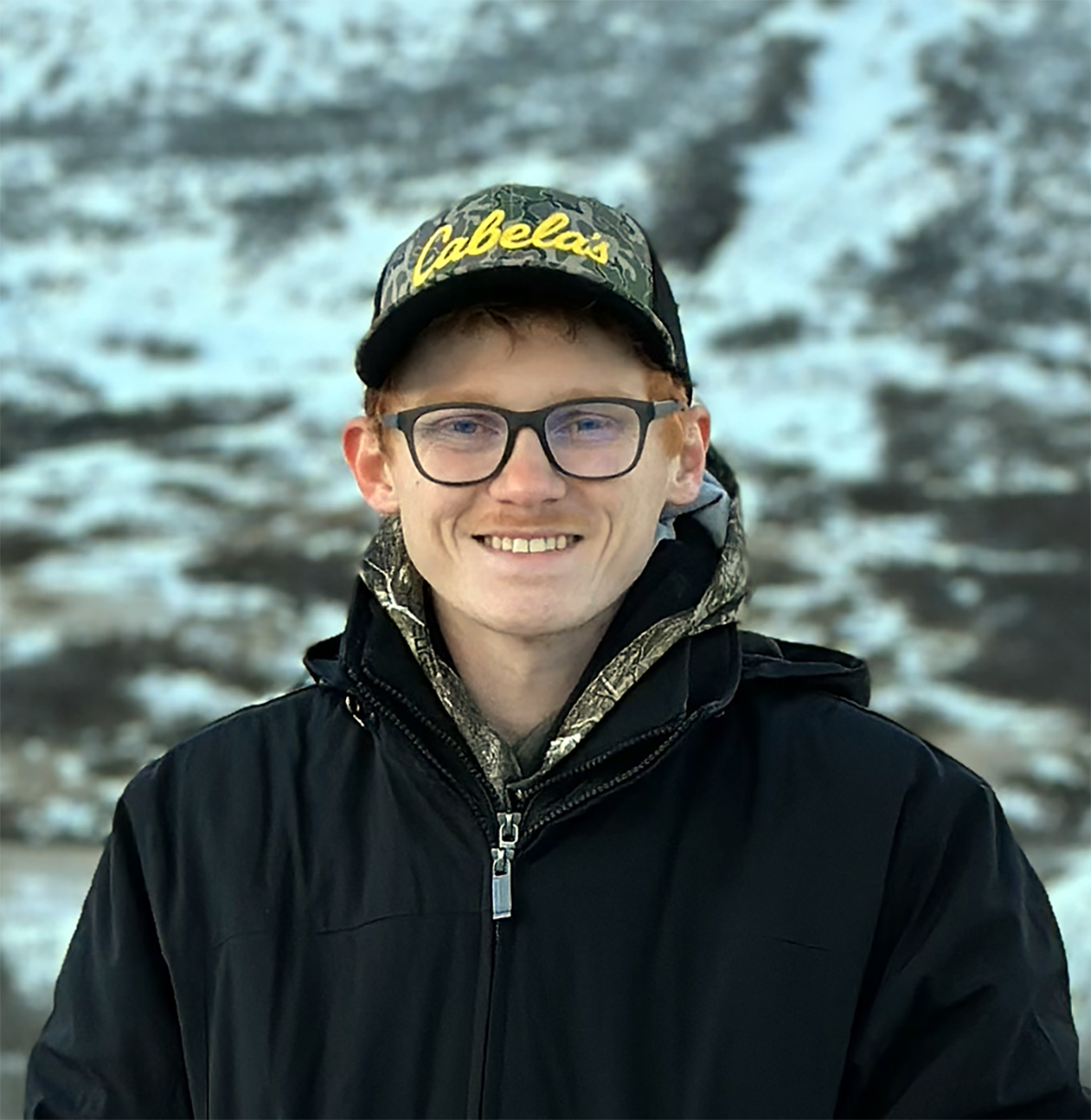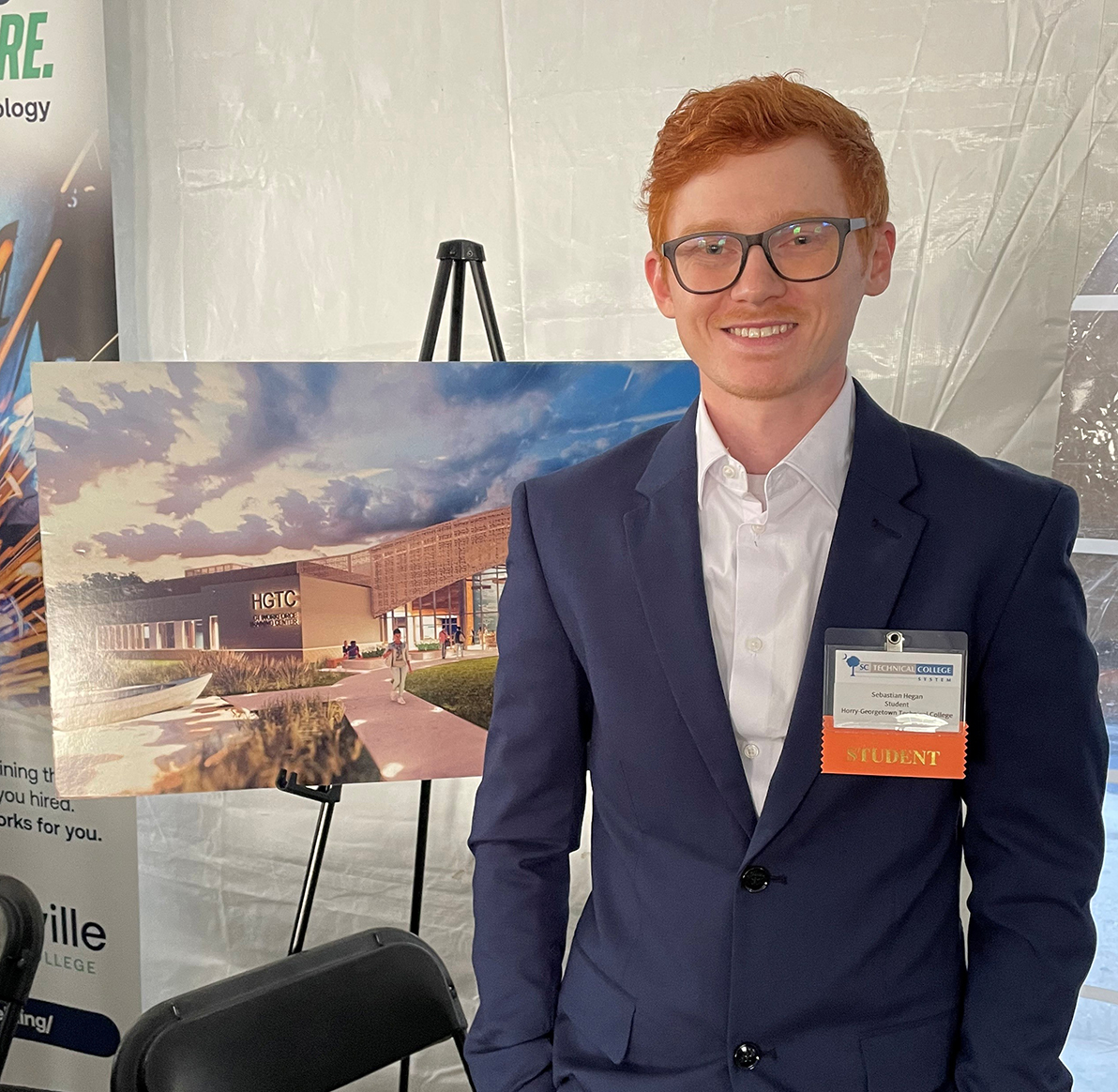
Sebastian Hegan
Horry-Georgetown Technical College
"Building boats allows me to be creative with my hands and my mind, and that’s really satisfying."
One moment, Sebastian Hegan was serving as a combat engineer and planning to re-enlist in the Army. The next? He was recovering from multiple surgeries and facing an uncertain future.
It was a plot twist he never saw coming.
But it eventually led him to something delightfully unexpected – building boats. The hands-on, creative work has been healing in its own way, and he’s once again excited about what lies ahead.
Walk us through your experience as a combat engineer – what your role entailed and how your injury occurred.
I joined the Army right out of high school and served for three years. I was stationed at Fort Knox, Kentucky. As a Husky operator, my job was to find IEDs [Improvised Explosive Devices].
One day we were doing a route training exercise as part of an eight-hour mission. I was in the lead convoy going up a hill to clear the path, and I was using four panels to detect bombs. There was a certain point where my panels wouldn’t penetrate the ground, so I was unable to detect the bomb.
When I got out of the Husky [which is protocol when a potential IED is detected, even in training] and they took off my body armor, I had a split-second, accidental impact with a medic.
To make a long story short, I ended up sustaining a serious injury that resulted in two surgeries and significant nerve damage, so I was unable to continue with a career in the military as I had planned.
How has your life changed since that injury?
Ever since that initial injury back in 2021, my health has been a roller coaster. I’ve had two additional surgeries related to the injury, I’ve battled gastrointestinal problems, and at one point I had to have my appendix removed.
When I was deemed medically unfit to serve because of the nerve damage, it mentally destroyed me. In addition to my physical problems, I miss the structure of the military a lot. I miss the way some people don’t act grown up and take responsibility for themselves. I miss what it was like to be a team leader.
I also miss some of the hobbies I had before I got hurt. I used to be a big fitness guy. I’d go to the gym twice a day, seven days a week. I’d also go hiking and take my drone out and do drone photography. But a lot of that got taken away from me when I got hurt.
You’ve been through so much – physically, emotionally, mentally. What helped you take those first steps toward starting over?
I’m originally from Pennsylvania, but my parents had a beach house here when I was growing up, so I’ve always considered South Carolina my second home. With the GI bill, I could go pretty much anywhere I wanted to, so I moved down here and started looking at what Horry-Georgetown Technical College had to offer.
They had an Outboard Marine Technology program that looked cool, but it was completely full. I wasn’t really sure about what I wanted to do, so I thought to myself, Do whatever you know.
When I was trying to get myself better and going through procedure after procedure, I saw comparisons between the structure in the military and the structure in healthcare – how the medical assistant talked to the RN, how the RN talked to the physician’s assistant, and so on. I also liked the possibility of going anywhere in the United States to work in the medical field.
So I enrolled in and completed the Medical Assisting program. I didn’t mind it, and my clinicals were fun, but I just could not picture myself doing that kind of work for the next twenty years of my life.
And that’s when the just-right program fell in your lap!
Yes! Horry-Georgetown started an entirely new Boat Building certification program that’s three semesters long, and since the Outboard Marine Technology program was still full, I said, “You know what? I’m just gonna do it. I’m gonna sign up.”
I didn’t really know what I was getting myself into. I mean, it’s very messy – working with fiberglass and all – and at first, it’s hard to imagine that you can build a boat from something that looks almost like little strands of hair.
But I think that’s why I enjoy it as much as I do. I get to see progress every step of the way. And I’m learning so much – lamination basics, gelcoating, how to use a chopper gun. (That’s my favorite!) Building boats allows me to be creative with my hands and my mind, and that’s really satisfying.

I also like the diversity of the people in the class. We have a 17-year-old who graduated high school early, but we also have an older guy who used to be a boat captain, and he’s full of hilarious stories. Everyone has different plans for when they complete the program. Some of them want to open their own business, some of them – like me – want to get industry experience, and some of them just want to learn how to work on their own boat. I love the crowd of people I’m with!
What advice would you give to someone who is interested in Horry-Georgetown’s Boat Building program?
Be ready to absorb everything you can because you don’t want to get behind. You can’t do too much homework on boat building, so you have to make the most of your time in the program. It’s Monday through Thursday, pretty much full-time, so expect it to be a big part of your life for the next year. There’s a lot to learn, but being able to see it in front of you – to do it with your own hands – is so awesome! I had no idea I would like it as much as I do.